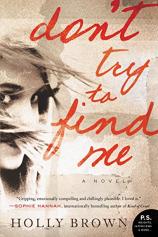Don't Try To Find Me
Review
Don't Try To Find Me
According to the National Crime Information Center in accordance with the FBI, there were 33,677 registered missing persons under the age of 18 in the United States as of December 31, 2014. The random disappearance of a child is one of life’s most horrific tragedies. Parents blame themselves, thinking: “What could we have done differently?” or “How are we to blame?” Marriages fall apart during the search. Often victims of kidnappings or other heinous crimes, many of these missing kids are rarely found.
But what portion of the 33,677 lost children ran away by choice? In her debut novel --- now available in paperback --- couples and family therapist Holly Brown turns a harsh but probing light on the phenomenon. DON’T TRY TO FIND ME is the story of a family full of secrets, failed attempts at communication, and a child caught in the crossfire of a crumbling marriage who takes her life’s course into her own hands.
Fourteen-year-old Marley is a normal kid --- or so her parents think. After moving from a posh exurb of San Francisco to a woodsy college town five hours away, she’s even less interested in school, extracurricular activities, or having friends than she was in the past. Plus, with her standoffish father a bigwig at a tech company and her overly sensitive mother working part time at a domestic violence nonprofit, Marley is mostly alone with her thoughts --- especially since no one seems to value honest interactions at home.
"The structure of DON’T TRY TO FIND ME plays an essential role in how Marley’s story unfolds.... Brown succeeds in shining a much-needed spotlight on what seems to be a widespread problem --- thousands of vulnerable children looking for love in all the wrong places."
As with any only child with an excess of time on her hands, it’s easy for Marley to see the holes in her parents’ relationship. While her father Paul is busy shaping his perfect image at work and neglecting his family, her mother Rachel has gotten hooked on anti-anxiety pills, not to mention an on-again, off-again emotional dependency on someone who isn’t her husband --- Marley’s one-time psychiatrist. Perhaps the two are so absorbed with their own needs and inadequacies that they’ll barely notice if Marley is gone.
The structure of DON’T TRY TO FIND ME plays an essential role in how Marley’s story unfolds. As we learn more and more about Paul and Rachel’s deteriorating relationship, we also follow Marley on her journey away from them in alternating chapters. Though this does remove some of the tension and potential for suspense from the plot, it also allows us more insight into Marley’s motives. She longs to be loved and leaves the “comfort” of her parents’ home in California to meet a boy she met on Facebook in North Carolina.
With a setup like this, it’s not surprising that Marley’s lover isn’t a boy. “B” is a man who’s 10 years older than he leads Marley to believe. He has a secret criminal record, an obvious taste for underage girls, and lives in a sterile basement apartment Marley isn’t supposed to leave. While such a storyline might seem implausible at first --- why doesn’t Marley realize her new beau is a sleaze? --- the framework works when you take into account Marley’s age. She hasn’t lived enough life to understand what horrors might lurk around every corner. She wants so badly to be grown up and paid attention to that she overlooks the red flags blocking her way.
DON’T TRY TO FIND ME also addresses the increasingly pervasive presence of social media and its potential for both deception --- as in Marley’s relationship with B --- and destruction. When Paul launches a full-fledged, multi-pronged social media campaign to find his daughter, what he doesn’t account for is the backlash that occurs. When you splash your personal life all over the Internet for strangers worldwide to see, you can’t control what they’ll do with the information --- and some of the responses are bound to be nasty.
It’s clear that Holly Brown mined her experiences as a therapist to populate the pages of her book as many of the characters’ inner dialogues are explored in great detail. While some of these neuroses may seem a bit heavy-handed at times --- Rachel’s especially --- they also come off as undeniably human. In the end, Brown succeeds in shining a much-needed spotlight on what seems to be a widespread problem --- thousands of vulnerable children looking for love in all the wrong places.
Reviewed by Alexis Burling on April 7, 2015
Don't Try To Find Me
- Publication Date: April 7, 2015
- Genres: Fiction, Psychological Suspense, Psychological Thriller, Suspense, Thriller
- Paperback: 384 pages
- Publisher: William Morrow Paperbacks
- ISBN-10: 0062305859
- ISBN-13: 9780062305855





